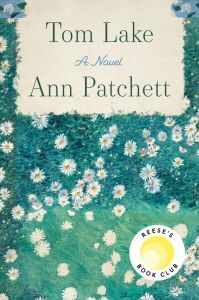Tom Lake, by Ann Patchett

This novel is told in two parallel timelines. In the story’s present day, it’s spring/summer 2020, and Laura and her husband Joe are enjoying having their three twenty-something daughters home while the world shuts down. It’s quality family time, but it’s also a hard-working time, because the family owns a cherry farm, and with quarantine regulations making it impossible for them to hire their usual seasonal pickers, everyone has to pitch in to get the cherries picked.
While they work, over a period of days and weeks, the young women urge their mother to tell them the full story of the time when, as a young aspiring actress, she had a brief affair with a fellow actor who went on to become a genuine movie star. Laura’s eldest daughter went through a teenage phase of being completely obsessed with actor Peter Duke and, knowing that her mother had briefly dated him, became convinced that Peter Duke was her real father. While Laura has pointed out that the timeline of the relationship, and of her marriage to Joe, doesn’t make that possible at all, the girls want to know the details.
So the present-day story of Laura and her daughters in the pandemic stillness of the cherry orchard unfolds alongside the story of young Laura, who got into acting through a single starring role in high school — Emily in Our Town — and returned to that role, after a brief stint in Hollywood, for a summer theatre festival where she starred alongside up-and-coming actor Peter Duke. The story of their love affair, and of Laura’s exploration of what she really wants out of life, makes a neat coming of age story.
I was interested to read in the Afterward that for Ann Patchett, as for Laura in the book, the play Our Town is a foundational text, because it is for me too, and in the oddest way imaginable. It’s had a bigger influence on me than any other play (and is top five in works of literature that have impacted me, generally), but I have never seen it on stage. The impact grew entirely out of reading the play (I don’t usually read plays!) during my college years, and being deeply touched by the idea of Emily coming back from the dead to relive one very ordinary day in her childhood. The concept that any ordinary, boring day is a day we would be thrilled to go back to if it were all taken away from us — that so many of us miss the magic of the everyday — has profoundly shaped the way I view the world.
While this scene, unlike many others in the play, doesn’t get directly quoted or referenced in the novel, I feel like the very ordinariness of Laura’s life after she stops pursuing an acting career is a tribute to Emily’s discovery in the play. Laura chose an ordinary life instead of the madcap roller coaster of Hollywood drama that she could have had with a series of men like Peter Duke, and the richness and beauty of the life she chose permeates the novel.
I really, really enjoyed reading this book.



